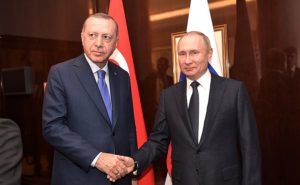 Image courtesy: DoD photo by U.S. Air Force Master Sgt. Jerry Morrison
Image courtesy: DoD photo by U.S. Air Force Master Sgt. Jerry Morrison
NATO’s Turkey Problem
In recent weeks, NATO ally Turkey has expressed its displeasure with several NATO allies. This includes criticizing French President Macron for his strategies and comments on Islam, Secretary of State Pompeo for visiting Turkey without meeting with Turkish President Erdogan, and Greek Prime Minister Mitsotakis amid tensions over energy and maritime territory in the eastern Mediterranean. This raises the question: is Turkey at odds with NATO?
A Defiant Turkey
Despite its NATO membership, Turkey’s foreign policy adventurism has been at odds with the U.S. and NATO allies, going well-beyond the issues mentioned above. In mid-October, Turkey defiantly tested its Russian-made S-400 air defense system, which the U.S. made clear was inconsistent with Turkey’s commitment as a U.S. and NATO ally.
The acquisition and deployment of the S-400 air defense system is more than just a questionable defense transaction with NATO’s chief adversary; the defense system has the ability to compromise the stealth technologies of the U.S.’ F-35 fighter program. The U.S. fears that such information could consequently fall into Russian hands.
In late October, NATO had to facilitate an agreement between Turkey and Greece to halt military exercises in the eastern Mediterranean after Turkish warplanes swept Greek warships near the Greek island of Rhodes. In the eastern Mediterranean, the two neighbors have expressed contrary claims to hydrocarbon resources and the extent of each state’s continental shelves. Turkey’s aggressive drilling in the eastern Mediterranean has been accompanied by research vessels and navy ships in Greek waters.
Months before, Turkey violated a U.N. arms embargo when it escorted a vessel of weapons into Libya; the French frigate Courbet – which is part of NATO’s Operation Sea Guardian – challenged the vessel and a Turkish warship responded by illuminating the Courbet with a targeting radar, forcing the French to withdraw. The orders of the Courbet to inquire about the cargo came directly from NATO’s Allied Maritime Command. The White House national security adviser, Robert O’Brien, told reporters after the incident that the U.S. supports France’s position in the dispute and urged, “NATO allies shouldn’t be turning fire control radars on each other.”

Turkish President Recep Erdogan (left) and Russian President Vladimir Putin (right). (Image courtesy: www.kremlin.ru.)
A Reluctant NATO
The recent chaos between Turkey and fellow NATO members has been an embarrassment to the alliance and has made Turkey seem more like a rival than an ally. French President Macron temporarily withdrew from Operation Sea Guardian after the Courbet’s incident in the Mediterranean. Macron asserted again that the alliance is suffering “brain death.” The incidents have also demonstrated NATO and the EU’s inability to enforce a U.N.-supported arms embargo meant to reduce the violence in Libya.
In October, NATO’s Secretary General Stoltenberg met with President Erdogan to express NATO’s support for Turkey, and to establish a military de-confliction mechanism with Greece. NATO’s reluctance to condemn Turkey’s actions exposes the alliance’s miscalculated perception: Turkey is too important geopolitically to criticize its misbehaviors. But since NATO requires consensus to operate, Turkish objections can impede nearly any proposed policy. Therefore, and considering Turkey’s latest unruly actions, a reluctant NATO diminishes its own legitimacy as an authoritative security enforcer.
A U.S.-Turkey Relationship Going Forward
The U.S. has played a less prominent role in NATO under the current administration. The U.S. is the most influential member of the NATO allies and has historically acted as chief mediator. The administration’s departure from this role may have emboldened Turkey to challenge fellow member states.
Even more, President Erdogan has gone so far as to challenge the U.S. directly. In response to U.S. criticism about its acquisition of the S-400 air defense system, Erdogan told the U.S., “you don’t know who you’re dealing with,” and to “impose your sanctions already, whatever they may be.” The U.S.’ Countering America’s Adversaries Through Sanctions Act (CAATSA), requires the executive branch to impose sanctions on states that buy defense equipment from Russia, but President Trump has refused to do so.
Despite this, Greece has called on the U.S. to return “to its central role as a leader of NATO.” President-elect Joe Biden will need to emphasize once again the importance of trans-Atlanticism, diffuse tensions between our Atlantic allies, and hold Turkey accountable for its disruptive behavior. The U.S. and Turkey have important interests in common, and a collaborative partnership between the states will be needed to draw Turkey back into NATO’s cooperative ranks. However, cooperation must not undermine a tough stance on Turkey’s adventurism. If the U.S. wants to re-establish its authority in the alliance, and maintain a cooperative NATO, it will need to start by challenging Turkey’s latest actions.





